#where one believes they’re an irredeemable monster when in reality they’re not while the other keeps them from becoming a true monster
Text
if levi had died during RtS instead of erwin, you just know that he wouldn't stop at killing zeke.
he'd patiently break down zeke's supports bit by bit, meticulously and thoroughly dismantling his plans and alienate even him from his most strongly-held ideals.
he'd kill everyone and destroy everything zeke has ever cared about.
he would make him watch as he tore it all down.
#rahhh don’t u love the ship dynamic#where one believes they’re an irredeemable monster when in reality they’re not while the other keeps them from becoming a true monster#then that person dies and the other TRULY becomes a monster?#eruri#aot eruri#snk eruri#eruri au
32 notes
·
View notes
Text

LIZZIE’S POV OF HOPE VS. JOSIE’S POV OF HOPE
I love therapy box episodes because it gives us a literal deep dive snap shot into the look of how someone views other characters. And they’re also a lot of fun. But the main story of this season thus far (talking the real S4 so 4x05-4x08) has been Lizzie and Josie going on these individual journeys that particularly emphasize how each of them view Hope because she’s currently in this big moment of her arc that is a real moment of no return, while Hope goes on her own tangential journey of running away from who she is ( though she would vehemently insist that she’s not running away from anything and this is actually who she is ). Beware legacies spoilers for last night’s episode (4x08) after this point.
This whole arc for Lizzie has been about getting revenge on Hope. Right from the start, she has been very reminiscent of S1 Lizzie, almost like Lizzie from 1x12, where she is over the top aggressive about it, making very obvious pointed comments and barely giving Hope a chance to breathe. Now I hesitate to say that it’s overly dramatic considering what Hope did, but Lizzie has absolutely refused to give Hope even a little grace or understanding at all.
That all translates into Lizzie’s western-themed therapy box where the premise and lesson are very simple. Hope framed her father and kidnapped her sister. From the get go, the audience is supposed to believe that Hope is the bad guy, because that’s exactly how Lizzie sees her in this moment. Even when she’s given more facts about who Hope is and the “gifts” that she can give, Lizzie spurns Hope’s hand and it’s clear that Lizzie sees Hope as the villain through and through.
This stands in contrast to Josie, who is making an excuse for everything that Hope has done. Josie, who is staying up all night and obsessively researching on ways to reach Hope, who shuts down any plan that has the potential to hurt Hope despite knowing it won’t kill her or even permanently hurt her. Josie is more preoccupied with finding a way to get Hope back and forgive her, and yes with the additional bonus of Hope maybe being able to heal Alaric, but she is willing to put herself in harm’s way to get to Hope.
Josie’s therapy box was about her realizing that she, and the rest of the school, places Hope on a pedestal, but it was equally about Josie realizing that Hope does that same to herself. It was about seeing how those expectations have burdened Hope so much that flipping off her humanity in this way was almost inevitable because no one, not even the almighty tribrid could withstand that kind of constant emotional labor. And unlike in a western-theme where the morals are pretty straightforward, the therapy box was set in a Grey’s Anatomy-style setting, where right and wrong and ethics are often clouded by love and emotion. It mirrors the way that Josie is approaching the “Hope” problem in the real world, where right and wrong is all sorts of mixed up because it’s never that simple.
And by the end of the episode we see Josie starting to push these thoughts along, where she realizes her mistake thus far has been treating Hope like she’s only good and that she can do no wrong, when in reality she makes mistakes just like the rest of them and feels the same pressures and burdens that the rest of them do. Regardless of whether she is some prodigal medical intern or the mythical tribrid, that doesn’t make her immune to emotions. I have a feeling the mid-season finale will also have Lizzie making a similar, but opposing realization that her mistake thus far has been treating Hope like she’s an irredeemable monster when the truth is that everyone at that school is a monster in some way and Hope is still one of them. That the truth is not so cut and dry as she wants it to be, and that will be the pill she needs to swallow.
Why is this important, you ask? Well, it’s important because one of the core fears that Hope has, is that she will never be seen for who she is. All her life, the outside world has treated her like a supernatural threat, or some horrible monster destined to destroy the world. Even students at the school gave her a wide berth when the truth of her name came out, like she is forever one second away from snapping and brutally hurting people. The way Lizzie currently sees her.
Alternatively, she has been the princess who can do no wrong. The shining jewel of the Mikaelson family, the family’s hope. She was supposed to stand for a thousand years’ worth of redemption and be the glue of the family. While Hope has never doubted that her family loves her, that kind of pressure is still incredibly difficult to bear because she doesn’t want to let them down. This is the way Josie currently sees her.
But the real Hope is a combination of the two. She’s a real person, messy and obsessive, paranoid and arrogant. We had an entire season showing just how flawed and fucked up Hope Mikaelson could be, and that she doesn’t always know the right answer. She’s neither a mindless monster nor a selfless hero but she carries facets of both. Like she says to Landon in 1x05, “some of us are nicer, some of us have more control, but all of us are capable of [doing what he did]”, referencing when Jed beat the crap out of Landon. She is the daughter of Klaus Mikaelson and Hayley Marshall, the only tribrid to ever exist. Hope has only ever been acutely aware that she is neither the monster people say nor her family’s hope. It is fundamentally important to Hope that those closest to her see her as that nuanced flawed person, and I am loving watching those arcs play out with Josie and Lizzie.
All three girls need to reconcile that Hope becoming a full tribrid did not fundamentally change anything about Hope, but rather, like everything else, heightens these varied facets to her. Lizzie is currently focused on the more monstrous side, and Josie on the more heroic side, while Hope seems to be running from both by avoiding her humanity. Now, as part of my clown shoes agenda, I’m going to sit here and manifest that this means both Josie and Lizzie are going to be needed to help Hope flip her humanity back on.
#[ lore. ]#[ meta. ]#legacies spoilers //#this season has validated so much of my headcanons and portrayals
5 notes
·
View notes
Text
What Do We Do With Civilian Orcs?
The idea that elves were going around slaughtering whole families of orcs is baffling to me. The Kinslayings are a big deal for a reason. The orcs are elves’ kin and even if they might express hatred towards them it’s the hatred felt towards Frankenstein’s Monster or any innocent abomination. When I see a malformed little pedigree dog with no training I don’t hate the dog, I hate the culture that made this little drooly monster that can’t breath. Certainly there are some grudges more vitriolic and personal than others (Elladan and Elrohir, for example, or Beren towards the orcs occupying his home) but largely people pity orcs. The issue is that they’re just too dangerous to rehabilitate.
I either saw or hallucinated a very good post about orc POWs recently but it included this quote from Morgoth’s Ring.
... the Wise in the Elder Days taught always that the Orcs were not 'made' by Melkor, and therefore were not in their origin evil. They might have become irredeemable (at least by Elves and Men), but they remained within the Law. That is, that though of necessity, being the fingers of the hand of Morgoth, they must be fought with the utmost severity, they must not be dealt with in their own terms of cruelty and treachery. Captives must not be tormented, not even to discover information for the defence of the homes of Elves and Men. If any Orcs surrendered and asked for mercy, they must be granted it, even at a cost.* This was the teaching of the Wise, though in the horror of the War it was not always heeded
Footnote: Few Orcs ever did so in the Elder Days, and at no time would any Orc treat with any Elf. For one thing Morgoth had achieved was to convince the Orcs beyond refutation that the Elves were crueller than themselves, taking captives only for 'amusement', or to eat them (as the Orcs would do at need).
There are obvious reasons why Morgoth would brainwash his shock troops into thinking that death is safer than surrender. It makes the likelihood of him getting stabbed in the back far less. It also means that orc soldiers were willing to take a lot of measures to avoid capture, which suits his purposes nicely. But soldiers aren’t the only orcs out there. There must be orc villages (certainly their numbers replenish quickly) and even orc families. Why can’t they be redeemed? And if the “Wise” obey the fantasy Geneva Conventions then what happened to all those orc non-combatants in war time?
First, lets remember that brainwashing doesn’t only effect soldiers. Civilians would have a whole head full of Morgoth’s Best Doublethink too. That means that they’re going to be trying to avoid capture as much as possible. Orc civilians aren’t going to stick around in villages that elves are bearing down on if they have any possible escape route. They’ll run. And frankly, most of our heroes probably aren’t going to chase them. Capturing orc civilians means having to treat them well and that means dealing with a bunch of hostile, vulnerable prisoners. Better to let them go. (Obviously some more pragmatic individuals are going to suggest actions that do not follow the fantasy Geneva Conventions because, after all, letting orcs go means you have more orcs to deal with later, but lets pretend for now that we’re dealing with “the Wise”. Which hopefully, we are! Tolkien’s work emphasizes the fact that, though evil is everywhere basic decency is also found even in the darkest of places.)
So if you’re an elvish force moving through an orc village at night, congrats, most of the civilians will have left. It’s hard to tell how orcs age or if they bother to keep around the old and infirm but their maybe-elvish roots suggest that they’re pretty sturdy lifespan-wise, making for a more mobile population than a human village. Orc kids also seem to age fast, to account for Mordor’s great armies, so most orcs should be able to evacuate. Maybe, maybe there are some stragglers- pregnant people or those with very small children, but your best solution there is to just turn a blind eye. The orcs are more scared of you than you are of them. And, not to get too dark here, most of the elves probably learned pretty early on that the best way to keep orc parents from smothering their sobbing infants was to just... pretend not to notice them.
If the attacking force is human things might be more complicated, as there’s less of a conditioned fear response to humans than elves. You’re more likely to see both good and bad outcomes. The good- some orcs children and other assorted non-combatants have probably accepted human help over the years. They might not have stuck around for long but they got wounds treated and even accepted a meal or two. The bad- they’re also a lot braver around humans and a lot more willing to launch ill advised attacks. Similarly, humans have less of the orc pity/hatred baggage elves do which is a mixed blessing. They’re more willing to see orcs as people! To believe in their innate goodness and not write them off as broken goods! And also a bit more likely to just murder the lot of them because the human kinslaying taboo is not as universal as the elven one.
The problems start to arise when there isn’t space for an orc civilian population to escape. It’s sunny or they’re surrounded. Either way it gets... messy. Suicide as a method of escape when boxed in by enemies is very historically accurate and as much as it makes me squeamish I feel like it’s a very orcish thing to do. So all things considered, the “Forces of Good” probably didn’t have to do a lot of civilian killing. Morgoth’s excellent conditioning job and the realities of war (you can try to avoid moving through civilians areas for a while if you know it ends poorly but ultimately you do have to secure your surroundings) probably did it for them. Of course awareness of this as a factor would have made the humans and elves partially culpable in how they handled the taking of orc encampments, but again, there’s only so much damage minimization that can be done.
Certainly, there would be survivors. Even the semi-archaeologically evidenced Siege of Masada had a handful of them. Thus the moral conundrum of “what happens to orc civilians” is moved from a large group (orc communities who would not tolerate being taken alive) to a smaller one (individuals on whom the brainwashing didn’t take, the old and canny or the very young and helpless, the injured and the fragile). These people may have been taken prisoner and in the early days efforts may have been made to “rehabilitate” them.
The text suggests these efforts failed so let’s dwell for a second on why that might be. Obviously no being is made evil. Destructive actions and toxic behavior can be taught, however, and once learned they are hard to unlearn.The evil of Morgoth was in his ability to begin cycles of violence in others. Orc society wasn’t bad because they were bad, it was bad because they were systematically (and likely intentionally) abused for a very long time with the intention of making it impossible for them to reintegrate back into elven (and later, human) society. You can say this about Morgoth and Sauron, they know how to mess people up mentally. Orcs may be sentient and capable but their empathy, non-violent social skills, and other gentler instincts have been stripped away by years of calculated pressure. Even if a captured orc was completely unable to fight back (which would be their first instinct) or harm themselves (their second) they would still struggle to respond to their captors, reforge social bonds, and relate to others without the paradigms of violence and control that orc relationships are built on. We see in LotR that even in casual situations orcs define each other by servitude and power, there’s no reason to believe that civilians would be dramatically different- a bit softer perhaps but still sharp.
So most adult orcs, even civilians, aren’t going to be able to integrate into an elven or human community, even if you do take them prisoner. Best case scenario they’ll book it, worst case, you’ll have a tragedy on your hands. They’re still going to suspect you’re keeping them around for food, they’re still going to hate you, and ultimately things are still going to end poorly.
But what about a very young orc?
This is where things get weird. Maybe they’re safe and happy and noticeably orcish and raised in woke adoptive families but we don’t see evidence of that. You’d think The One Good Orc would at least get a lay. Humans raised by elves got like, seven. One option is that orc infants raised in elven or human environments are mostly elven, so it never gets mentioned, But that just plays into some very weird and frankly disturbing history that most imperialist nations have re: baby kidnapping, so let’s not do that.
There must have been abandoned orc infants at some point. Logistically the facts of the story demand it. Orcs (presumably) have lots of babies, the good guys sometimes retake lost territory, there are Geneva Conventions. But we never see the natural results of such an event so we’re left with with a mystery. Having written previously about elf infants and their finickiness, I have a (tragic) solution:
Orc kids just... don’t thrive in the care of strangers.
No one has figured out how to hand rear baby orcs yet! It’s very unfortunate. Maybe it’s the all meat diet. Maybe Morgoth threw in a failsafe. Most likely it’s a natural result of them previously having been elves. If elf kids are vulnerable to sudden changes in environment, why not orc kids? Obviously they’re going to have to be hardier overall, they’re more likely to be orphaned and probably less treasured, but infants as young as a few weeks can distinguish different types of faces. Being able to tell weird squishy strangers apart from good strong orc babysitters would not be a stretch for even a newborn. Maybe that’s what the fangs are for, they break up the face geometry enough to throw alarm switches in a baby’s brain. And once an orc child knows that they are not with friends they could easily just... fail to thrive. Which is, again, awful, but this whole situation is awful. The orc life is tragedy.
So, orc civilians are unwilling to be taken alive, hate captivity, and even at a very young age mistrust non-orcs. Orc infants are very difficult to take care of if you’re not an orc (there were some hesitant handpuppet attempts at some point in Lindon but they could never replicate the musk) and any orc old enough to fend for itself is also old enough to try to fight you and have a bucketload of subtle brainwashing and serious behavioral issues. You don’t have to commit war crimes for this to still be a volatile population.
However, I wanted to end this very depressing essay on a happy note. The text notes that “few orcs ever did so in Elder Days” which means that it did happen. There were orc success stories. In the War of Wrath some of the Easterlings took in orc injured and successfully integrated them into the community to such an extent that the only marker a few generations later was their weirdly long lifespan and fondness for rare pork. In the mid-Third Age there were a handful of offshoot communities in the far North which had an orc living in their village, a relic of some ancient war. Early in the Fourth Age several families in Rohan and Gondor fostered older Uruk-Hai children. And by the time the last orc villages were being encroached upon by Men, the vestiges of Sauron’s cultural conjob had worn off to the point that the orcs came out and treated with their new neighbours and over time Men and Orcs grew together.
And that’s why the British are like that.
25 notes
·
View notes
Text
Marvel Cinematic Universe: Avengers: Age of Ultron (2015)
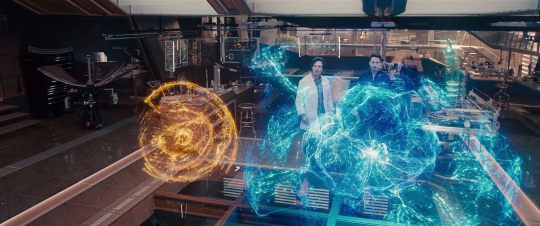
Does it pass the Bechdel Test?
Yes, once.
How many female characters (with names and lines) are there?
Seven (30.43% of cast).
How many male characters (with names and lines) are there?
Sixteen.
Positive Content Rating:
Three.
General Film Quality:
Significantly flawed, and well-known in fandom for it. Unpopular opinion? I still think it’s better than the first Avengers film.
MORE INFO (and potential spoilers) UNDER THE CUT:
Passing the Bechdel:
Natasha and Laura pass in a single-line trade. It’s sooo close to not counting.
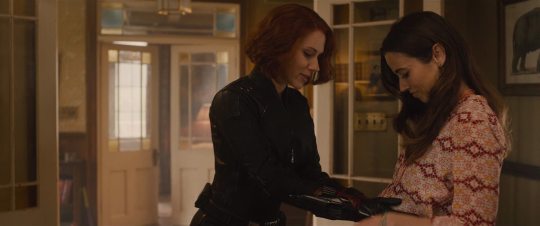
Female characters:
Natasha Romanoff.
Wanda Maximoff.
Maria Hill.
Helen Cho.
Peggy Carter.
Laura Barton.
FRIDAY.
Male characters:
Tony Stark.
Steve Rogers.
JARVIS.
Thor.
Clint Barton.
Strucker.
Pietro Maximoff.
Bruce Banner.
Ultron.
Sam Wilson.
James Rhodes.
Ulysses Klaue.
Heimdall.
Nick Fury.
Erik Selvig.
Vision.
OTHER NOTES:
Everyone talking about Strucker like we already know who he is...
The “Shit!”/”Language!” gag was funnier before they hung a lantern on it. Not least because it takes almost a full minute before Tony harks back to it (fifty seconds, actually. I checked). If you’re gonna make a Thing out of it, you gotta follow up immediately, not after fifty seconds of cutting around to different character intros and action shots and a whole lot of other dialogue.
Urrgghh, ok, I’m going to break my standing rule about not discussing source material, because we gotta acknowledge the colossal wrongness of re-writing the Maximoff twins - canonically Jewish Romani - as willing volunteers in a Nazi science experiment. It gets worse the more you think about it. There are a few things about this movie which generated significant negative outcry, and this incredibly offensive decision is one of them.
Tony and Thor fighting over who has a better girlfriend does have a certain charm to it. If you’re gonna have a testosterone-off, it might as well be about how great your partner is.
I got a zero out of ten on this out-of-nowhere forced romance crap with Natasha and Bruce. We’ll come back to this later.
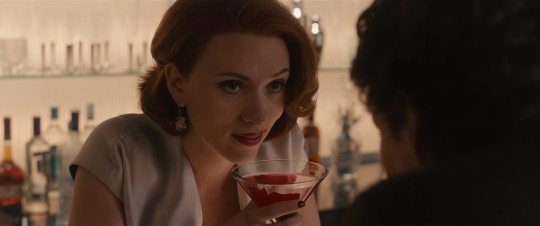
“I will be reinstituting Prima Nocta,” Tony declares, as he prepares to lift Thor’s hammer and thereby theoretically take charge of the Nine Realms. Primae noctis (believed to in fact be a myth) refers to a supposed Dark-Ages law that granted lords the ‘right’ to take the virginity of any newlywed peasant woman who lived on their land. So, this is a wonderful little rape joke from Tony (or, y’know, not so little, since primae noctis in reality would make Tony a serial rapist). Ha ha ha ha. Hilarious. Good one.
I’m really mad about the parts here that are total garbage, because mostly, the revels sequence has a nice low-key quality to it, good solid team dynamics.
I can’t fucking believe that they played the ‘and then Bruce falls with his face in Natasha’s cleavage!’ gag. I cannot believe it. Is this a disgusting frat-boy comedy from the nineties?
Honestly, Tony, just shut up and admit that you KNEW from the get-go that it was wrong to try and make Ultron happen (that is why you kept it secret from everyone else to begin with); don’t try to defend the decision now that you’ve got a ‘murderbot’ on your hands. Take responsibility for a bad choice instead of talking shit about how you had to and everyone else is just too short-sighted, damn it!
Andy Serkis is delightful.
The Iron Man/Hulk fight absolutely KILLS the momentum of this film. It goes for way the fuck too long (eight minutes) and has no narrative significance at all. Pro tip for action scenes: they should always be driving the story somewhere. You can pull off eighty minutes of action so long as your plot is advancing alongside/within it.
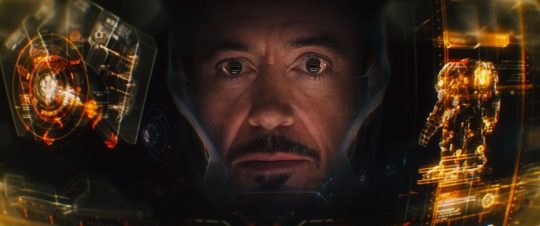
Also, Iron Man causes a huge amount of additional damage during this fight, in the service of the aforementioned pointless action. His efforts to minimise Hulk’s effects are extremely poor, and calling in his relief organisation to clean up after the fact does not negate that.
Gotta love that throwing a wife and kids at Hawkeye at the same time as we suddenly start pushing this Natasha/Bruce thing. That’s not transparent at all. I also understand this to be a major deviation from Clint’s identity in the comics, and very unpopular with fans for that reason, but regardless; reinventing him as a family man to reset the romantic blather after baiting fans with the possibility of Clint/Natasha in the first Avengers movie is such a shitty move. I was not invested in the ship myself and would have loved to have them reinforce the just-friends relationship between Hawkeye and Black Widow, because there are not enough platonic friendships between compatible men and women in fiction, but 'they’re not interested in each other because they’re busy with someone else!’ is a weak reinforcement indeed. Less forced romances, and definitely less token wifey who exists for no other Goddamn reason at all. This comes out of nowhere, and not in a clever-surprise kind of way.
“You still think you’re the only monster on the team?” Natasha says, after telling Bruce about her sterilisation. This earned a HUGE backlash, and for good reason - despite all arguments about how what Natasha meant was that her being raised to be an assassin makes her a monster, the direct implication of her words as they are phrased and as the discussion is structured is that her inability to have children makes her monstrous, and that’s deeply offensive. It’s also completely in keeping with a narrative which is often played out against women, in which their value as people is attributed directly to their ability to produce offspring, so it’s not even like this outrageous implication of monstrosity - the corruption of what it means to be female! - is that unusual. It’s awful, but not unusual. Add on the fact that 1) Natasha’s nightmare-flashes specifically foregrounded her sterilisation over all other details of her training, supporting the idea that she believes that it’s what makes her irredeemable (instead of, y’know, all the murdering and stuff), and 2) this is Joss Whedon’s work and he is OBSESSED with highlighting the womanhood of his female characters and treating it like their defining trait while also variously punishing them for it, and you’ve got every reason to interpret this terrible fucking line as exactly the heinous thing it (presumably, unwittingly) seems to be.
Steve ripping a log in half with his bare hands is the funniest thing in this whole movie.
Thor’s brief side-adventure with Erik Selvig is pretty out-of-place. He just...goes for a swim in a convenient magic pond that Selvig chances to know about. Seems normal.
Ultron is full of such boring, empty rhetoric. Reminds me of Loki in The Avengers, with all that sound-and-fury.
I love Paul Bettany.
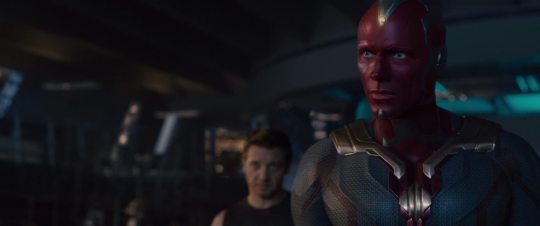
Man, they sure do find Natasha instantly. It’s almost like making a damsel-in-distress of her who needs to be rescued by the team was completely meaningless...
Breaking my no-BTS rule (since I already have done for this movie at this point) because it’s well-known how Joss Whedon ordered Elizabeth Olsen not to show exertion or ‘ugly emotion’ on her face in this film, because God forbid she compromise her attractiveness by being human. Joss Whedon is not human; he’s fucking trash.
The final fight sure does just, y’know, get to a point where it ends. They really did not ratchet up the tension over the course of the Sokovia conflict, it just goes along until it stops (also, they say Sokovia is a country, but then they never call the city anything else, it’s just Sokovia. Is the city conveniently named after the country (very confusing), or is it a city-country, like The Vatican? I kinda assume it’s option three, which is that no one bothered to care because it’s just some fake European placeholder anyway and we’re not supposed to notice such a dumb oversight).
“I was born yesterday.” This is the best quip in this whole thinks-it-is-way-wittier-than-it-is movie.
Helen Cho deserved better than to be a prop rapidly dismissed and then just trotted past at the end for an ‘oh, she survived, btw’.
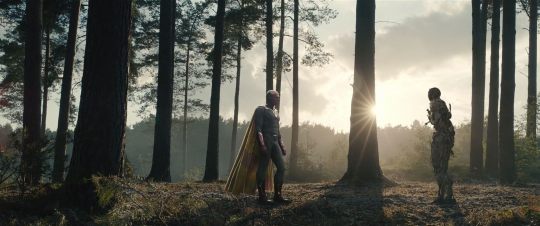
Back when I reviewed the first Avengers movie, I said that I considered that film to be heavily overrated, so maybe it’s not such a surprise that I actually like this one better. The two primary problems I had with that first film were the overly simplistic plot, and the fact that most of the characters were OOC compared to previous films, and this movie does do better on both scores, so I feel more engaged by it, and less annoyed. That said...this movie has still got a lot of problems, and those include iffy characterisation and a plot with various holes, nonsensical complications, and conveniently ignored or smoothed-down dynamics. When I say I like this movie better than the first one, I mean just that: I like this better. That does not mean I am here to sing its praises.
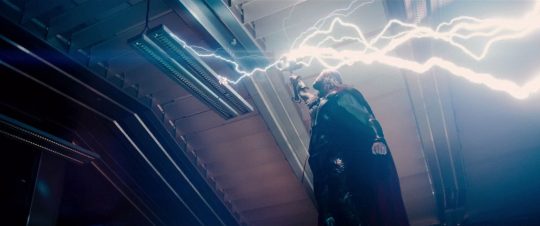
The tacked-on romance is part of the problem - for Clint as well as Natasha (but especially for Natasha). After Hawkeye was so heavily under-used in the first film (and his slightly-ambiguous relationship with Black Widow was the only human element that made him a character instead of a prop), Age of Ultron attempts to compensate by giving Clint a personal life, in the form of a magically-appearing heavily-pregnant wife and a pair of nameless children. The function of this family appears to be 1) to give Clint a reason to not be interested in Natasha, and 2) to ‘humanise’ him by giving him something to fight for and get home to, because we all know nothing legitimises a character quite like some otherwise-irrelevant dependents. Want a man to seem lovable and important? Give him a pregnant wife. That’s what women are for, anyway, right? To enhance a man’s story? In this case, to provide a man whose purpose in the story has been contested with insta-personality, because ‘he’s secretly a family man, ooh, twist!’ is way better than having to spend time on giving him something to do in the plot that is actually meaningful in some way. Great logic. Makes Hawkeye super dynamic, right?
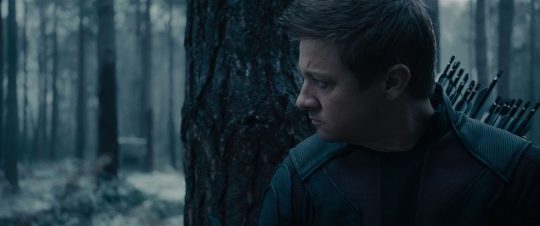
Natasha, unsurprisingly, is hit much, much harder. As the only female avenger and one of only two prominent female characters in a cast which has seven-to-nine male characters of equal or greater importance/screen time (YMMV on whether or not you think Fury and Vision count for that list), the pressure is already on for Natasha to be served up a quality narrative, because if she doesn’t get one, well...she doesn’t have six-to-eight alternative characters to pull the weight for her gender. The best solve for this problem would be to avoid the ‘Token Woman’ cliche in the first place, but since we missed that boat...not having the personal story of your only primary female character revolve completely around her womanhood and her catering to heteronormative expectations of a love interest would have been a good choice. This weird, forced, chemistry-free thing with Bruce Banner? Was the worst thing they could have used to define Natasha’s presence in the film. It sticks out like a sore thumb every time they have an awkward interaction, and it leads in to that atrocious ‘monstrous infertility’ element (though that particular egregious mistake could have been included with or without a romantic blunder, it...probably wouldn’t be, and we’d all be the better off). Even the Hulk-whisperer part of the relationship - while not awful on its own with all the unnecessary romance and Unresolved Sexual Not-Tension removed - serves to highlight Natasha’s female-ness by making her the soft maternal figure for the team, because God forbid one of the other male members of the team be asked to ASMR-speak to the Hulk while delicately caressing his hand. If Natasha’s presence in the first Avengers film leaned too heavily on her gender identity as a defining trait (and it did), this movie doesn’t fix that problem at all: it doubles down on it.
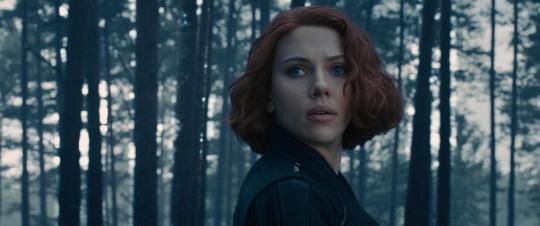
The good news for most of the excess of male characters is, they by-and-large don’t feel as OOC as they did in the first film. The boorish romantic entanglement aside, Bruce Banner is still a naturalistic character highlight (all credit to Mark Ruffalo, who probably doesn’t know how to turn in a bad performance in the first place), and Thor’s dialogue is way less ridiculous this time ‘round, so he lands a lot closer to his personality from previous films simply by virtue of sounding like the same guy (unfortunately, the plot does not have the faintest idea what it wants to do with him as a character). Steve Rogers is still being written as if being Captain America is his character, which is a fundamental misunderstanding of his identity, albeit one which conveniently allows him to behave in a stereotypical self-righteously bland manner, thus avoiding the need for any nuance in his perspective or actions. This borderline fanfic-flamer ‘Captain America is my least favourite character so I’m going to write him as a boring stick-in-the-mud and then hopefully no one else will like him either!’ approach doesn’t grate quite as badly as it did in the first Avengers, and it can’t cancel out the innate level-headed charm of Chris Evans, so as disappointing as the bias is, it’s still a better balance here than it was last time. The one character who is not so flatteringly handled, however? Also happens to be the one who was arguably handled best last time, and unfortunately, he’s the one who is essentially treated as the ‘lead’.
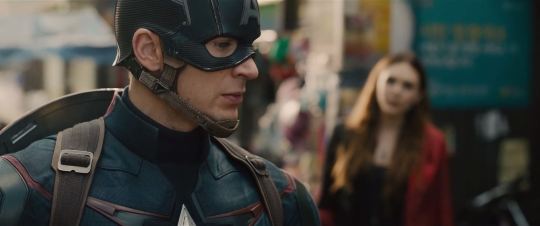
The big problem for Tony Stark is that this movie is not interested in digging in to the pathos of any character, it’s all-flash-no-substance on that front, and Tony really, really needed a less heavy-handed slathering of ‘afraid of what might come (feat. messiah complex)’ to motivate his actions and reactions in this film, because without any exploration he’s basically just a billionaire kid playing with matches. If this were an Iron Man film (either the first or third one, anyway), we’d get into some tasty deconstruction of Tony’s mental state and confront his hubris, etc, and - crucially, most crucial of all, it’s a mainstay of all his past stories in the MCU - Tony would own up to his mistakes, listen to the advice of those around him, and take contrite steps toward fixing the problem not just in the direct sense of ‘beating the bad guy’, but also in the personal and emotional sense of working on his own flaws and making amends with the people he hurt along the way. This movie offers none of that. To begin with, Tony’s ‘I know best and I will not be taking any questions’ approach to creating Ultron feels like a significant step backwards in his character development so far (Iron Man 3 was specifically about addressing his PTSD and associated tumultuous emotions surrounding the fear of imminent alien invasion, so his reactionary and secretive behaviour in this film feels particularly out-of-touch with a mental reality Tony has been explicitly working on for the past couple of years); Tony is actively aware that it’s a bad call and thus hides it from the other Avengers until it’s too late, and then he’s bizarrely unrepentant about his mistake. Worst of all, he actually attempts to repeat that mistake, only worse, late in the film (the fact that his idiotic ‘mad scientist’ pep talk actually convinces Bruce to help him again is the weakest character moment for Bruce outside of the aforementioned romance crap). The plot rewards Tony’s second, far worse mistake, in the creation of Vision, who turns out to be ‘worthy of wielding Thor’s Hammer’ and whatnot and conveniently provides every necessary skill to defeat Ultron in a deus ex machina so overt you could use it as a textbook example, so even though Tony had absolutely no way of knowing that he’d get a good result this time and almost every reason to believe he’d just compound the existing problem, his reckless disregard for the literal safety of the planet is treated like a good thing because it happens to work out this time, and they just kinda sweep under the rug the fact that Tony is playing God (and being uncharacteristically stupid and selfish about it - in other films, Tony is normally only reckless with his own safety, and it’s when his actions spill out into unintended consequences for others that he realises the error of his ways and cues up a positive learning curve; it’s what makes him palatable). At the end of the film, once Ultron is gone and Tony has thrown some dispassionate wads of cash into ‘relief efforts’, he strolls and quips and eventually drives off into the sunset in his expensive car, with nary a mention of, I dunno, maybe a little guilty conscience? Maybe a hint of having learned a valuable lesson? The closest he gets is just suggesting that it might be time he retires from Avenging, but neither he nor anyone else lets on that there’s a need for serious self-reflection. The Tony Stark in this movie is the nightmarish male-fantasy version of the character, the playboy with the cool tech and no limits who does whatever he wants and then...literally rides off into the sunset in the end, no muss, no fuss. He’s kinda like a complete reversion to his original self, pre-Iron Man, frittering money around and designing weapons of mass destruction while convincing himself he’s bringing peace to the world one explosion at a time, but that Tony has no business here, seven years of character development down the track.
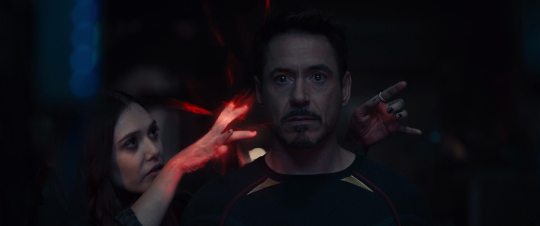
While we’re talking iffy characterisation, we should also segue into plot, and that’s something we can do easily enough by looking at our villain, Ultron. Calling Ultron an actual character feels...ambitious. He’s a CGI robot full of empty rhetoric and, you guessed it, more of those quips that this movie has in place of any meaningful dialogue. I’d call him self-fellating, but he ain’t got nothing to fellate, so instead he just blathers a lot in a manner that sounds vaguely poetically intelligent but is, upon a moment’s consideration, just vapid nonsense (much like Loki in the first Avengers, as noted above, but at least Loki had the benefit of a flesh-and-blood actor delivering his lines with conviction; James Spader does solid work as the voice of Ultron, but trying to make a CGI robot who spouts a school-kid’s attempt at edgy philosophy sound like a genuine menace is an uphill battle). Speaking of genuine menace, I assume the reason the film is called Age of Ultron is because A Couple of Days of Ultron Causing Disturbances in a Handful of Specific Locations was too much. For all the big talk (and there is..so much), Ultron doesn’t get up to all that much trouble, most notably in the sense that he apparently has his code all over the internet and yet he doesn’t bother stirring up a single ounce of chaos with that ungodly power. Why bother including this as an element of the character if it achieves zero story? Is it purely to make Ultron seem ~unstoppable~ because he keeps downloading into new robots? Because it didn’t really land, y’all. They try to play it like a big victory for the good guys when Vision burns Ultron out of the ‘net, but in context it’s meaningless because he didn’t do anything while he was there. Pretty much everything about Ultron was all talk, little to no action - even a whole bunch of the trouble he did cause happened off-screen, with Maria Hill just popping in to let us know that ‘there are reports of metal men stealing shit’. Cheers, cool. And you know, Ultron makes a song and dance about how he’s going to save the world by ‘ending the Avengers’, but then he...does not pursue that at all. He tries to make himself a pretty body, the Avengers thwart him, and then he enacts a doomsday machine to destroy all life on Earth. Like every other aspect of the character, the whole ‘end the Avengers’ schtick is just white noise, there’s no meaning in it. Ultron is just a same-old-same ‘What if Artificial Intelligence wants to WIPE US OUT?!’ cliche, and maybe that’s what he was in the comics too, I don’t know, but it’s the job of the film to tell that story in a dynamic way, and they had two and a half hours to do it. And yet.
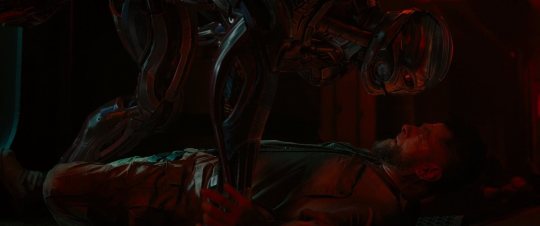
There should be more to this than a nondescript placeholder villain concept and a series of action set pieces that just kinda happen until they stop. At least the first Avengers had some variety in each of its action sequences, using the location and the different skills and weapons of its antagonists, whereas this one is just ‘there are robots and the good guys punched and shot them until they were all broken, the end’. Even making the city fly in the end doesn’t actually make it interesting, not least because the characters spend most of their time running around the (weirdly, perfectly stable) streets not having to deal with any consequences of being up in the air anyway, and the doomsday device is too nebulous to ratchet up any real tension about figuring out how to deal with it. The conflicts with the Maximoff twins have at least some spark of life in them, but the characters themselves are treated to an over-simplified and very contrived narrative arc that uses what they do and what they know more as plot devices than as details of actual people’s lives, leading to a cheap death for Pietro so that Wanda will be distracted enough to abandon the big ol’ doomsday button, and it’s just all so convenient. There’s no heart in any of it, and it makes the moments that try to have heart all the more embarrassing and out-of-place (don’t even get me started on what a prescribed attempt at tugging the heart-strings it is to have Hawkeye name his magnificently well-timed newborn after Pietro, because DAMN). When I said I liked this movie better than the first Avengers, I meant just that: I like this better. That’s not to suggest that it is significantly better in any sense, because it isn’t, and I can’t even argue that this one has a better story, because honestly, it doesn’t. The first film made more sense, it was just less interesting to watch, and the things about it that were contrived were contrived in different ways. The first film was weaker and more irritating on character, and character is always the most important part of a story for me, so as annoyed as I am by the major character blunders in Age of Ultron, I’m still not as annoyed as I was after The Avengers. That is damning with the faintest of praise; this is just not a particularly good movie, it makes a poor use of its cast at the best of times, delivers a sub-par action extravaganza, and the script is not half as witty as it gleefully convinces itself that it is. It comes as no surprise, I’m sure, that I am very glad a certain writer/director departed the franchise after disappointing everyone with this outing. I say I like this better than the first Avengers, but gee, it’s a close call.
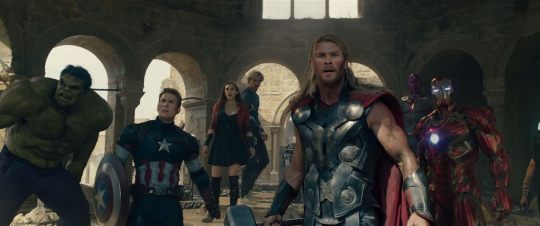
#Avengers: Age of Ultron#Marvel Cinematic Universe#Bechdel Test#female representation#MCU#Age of Ultron#Avengers
31 notes
·
View notes
Text
A Buffy rewatch 3x04 Beauty and the Beasts
aka men are still beasts part 2
Welcome to this dailyish text post series where I will rewatch an episode of Buffy and rant about it in 10-3k words. What you can expect: long run-on sentences and disjointed observations, often focused on one tiny detail about the episode. What you shouldn’t be expecting: actual reviews that make sense.
And I had some thoughts of today’s episode’s while watching, but I feel like I’m already forgetting half of them. Which might be the cider. (Or me being cranky about it being that time of the month. You know, the one where I turn into a hairy monster who may or may not have killed a man in the woods.)

I mean, what else are you gonna pair with background domestic abuse storylines.when you’d rather just chill with your wolfboy? Port wine? Get the fuck out of here.
Oz is always getting these all men are dangerous douchelords explorations I guess. It’s not that I don’t get it, his whole deal is about being seemingly the chillest guy on our Earth, except for 3 nights a month when he might just tear you to shreds. So yeah, I get it, Faith. All men are beasts. We all know your preferences.
(I believe we’ll definitely get more into Faith’s opinions on men, so let’s put a pin on that for now.)
As for the show, I’ve already had a rant about the Buffy feminism with Phases, which now I might just repeat (Idk, I don’t often read back these fever rants). The point though that I wanted to make here is when people say that Buffy’s ‘fighting the patriarchy’, they’re not just being melodramatic.
Like, that is a big theme here. Patriarchy, and rape culture, and the kind of aggression that’s specifically labeled as male. And then the show flips it sometimes, because we’re still playing with gender roles as well.
On the other hand, this story is maybe more aligned with the idea of ‘loving a beast’. Which… especially looking at the actual domestic abuse portion of the episode… is questionable at best.
I already mentioned my big ick when it comes to a lot of Buffyverse episodes that specifically delve into themes of violence against women. But in this case, the thing that makes me really uncomfortable is how much this is not phasing me.
Debbie and Pete’s - I think that’s their names, but the fact that I struggled during the episode remembering that, should be indicative of how much I was able to connect to them - relationship follows all the horrific red flags you could think of. The scene where Pete hits her and then Debbie ends up comforting him is just super fucked up.
…But they’re also minor characters in a storyline that’s stacked with main characters going through some pretty big stuff. The show often does this thing where everything is heightened, because supernatural elements, while still grounding the character stories in reality. And I’m not sure it’s working here, especially since we don’t really have a reference to grounding these two.
And then we get the bathroom scene with Debbie, Buffy and Willow. I understand the theme that’s going on there, how it’s a callback to Buffy’s S2 arc of ‘losing herself in love’… But it certainly doesn’t handle the subject of domestic abuse with any care or consideration.
“Don’t get hit.” Yikes.
There are intriguing ideas in this episode about compassion and agency, but they sure chose an extremely tough sell to drive their points home.
So instead I’ve been wondering - what if Oz actually hurt someone? What if that was the episode? On one hand, I understand that thematically they wanted to have these extremes to show Buffy’s conflict about Angel. So you would want an irredeemable monster of some sort in your story, in which case, Oz would need to be the gentle beast.
On the other hand, I just feel like that would’ve sparked a more interesting discussion about what love can and can’t excuse, especially since the audience also has their own bond to Oz at this point.
But hey, I will be definitely talking a lot about some beloved characters doing terrible things and how much I still love them, and that’s a promise.
This episode also made me wonder where Giles’ extreme dislike for Xander comes from. The way he rips into him here for sleeping during his Oz-shift juxtaposed with him gently waking Buffy up when it was her dozing off… I kind of wish that I tracked that better, because it definitely feels like he’s been sort of dismissive of Xander for a while now, but his outburst here felt like it was on another level.
Which is why I think it might come from Xander carelessly bringing up and shouting about Jenny during their Angel argument last season. I can definitely see how that would put Xander on Giles’ shitlist for life.
We’re also very close to the beginning of a storyline that I feel like is a lot of people’s least favorite of the season (which incidentally also features Xander), and honestly? I can’t wait to dive into that.
What can I say? I’m all about those bad choices.
And let’s pour one out for Mr. Platt, the real hero of this story. He set some high standards as a counselor for his successors to follow…
But, as always, I’m getting way ahead of myself.
1 note
·
View note
Text
Episode 102, part 3: ice ice baby
While Yugi and Yami search for her, Anzu is very sensibly running away from Penguinfucker, and gets a weirdly far distance into the surrounding woodlands before...
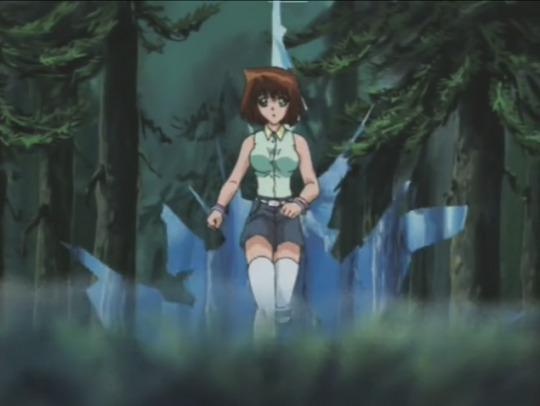
... everything gets all frozen, in like a “Elsa can’t control her powers” kinda way.
BECAUSE YES
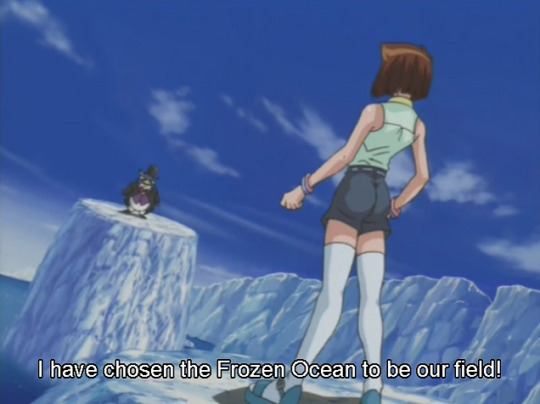
IT’S TIME TO D-D-D-D-DDDDDD-DEVolve into a fucking card game.
Anzu is like, “lol fuck I can’t duel” but Penguinfucker insists and tells her to choose a Duel Monster to be her Deck Master. And she chooses Dark Magician Girl, based on that trippy dream she had recently about that Broadway show she went to, and honestly, that’s not the worst reason so far for choosing a Deck Master. *meaningful look at Kuriboh*
And then THIS CREEP is all like...
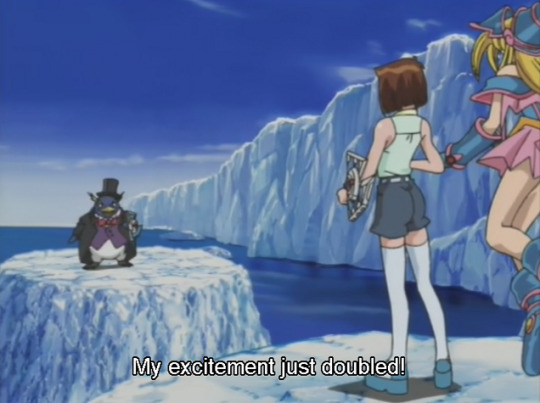
... because now there are two young women to ogle and he’s the ACTUAL WORST you guys. As with Seamonkey Fashionmodel, he is already actually in the form of his own Desk Master, due to a lack of body to otherwise inhabit.
(Why can’t Noah just make digital replicas of their actual bodies, or digital shells for them to inhabit, as he has made literally every single other fucking thing in this virtual reality? card games that’s why)
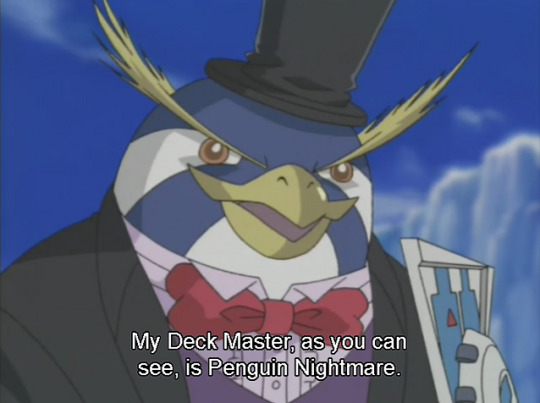
I can see that. I would rather I couldn’t, but I can. This angle allows me to also see that your eyebrows GO AROUND THE BACK OF YOUR HEAD so, um. yikes.
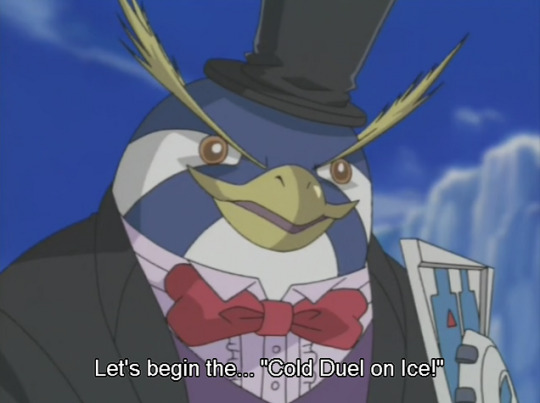
... just ... just “Duel on Ice” would have worked.
Anzu may not know how to duel, but she does know how to LOOK like you’re dueling:
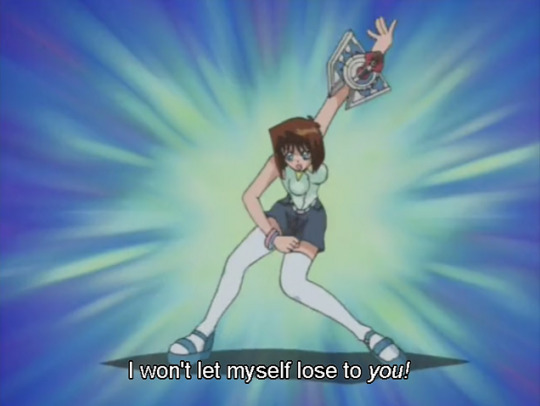
AWKWARD DRAMATIC POSES WHERE YOUR FINGERS DO CREEPY THINGS
#nailedit
So they start and like, obviously, OBVIOUSLY, quote unquote “there’s something DIFFERENT about THIS duel” because there’s something DIFFERENT about EVERY duel and it’s always a slight variation on “a part of the player will be harmed in some way as their life points decrease” and given that this is an ice-themed duel I’m going to guess that--
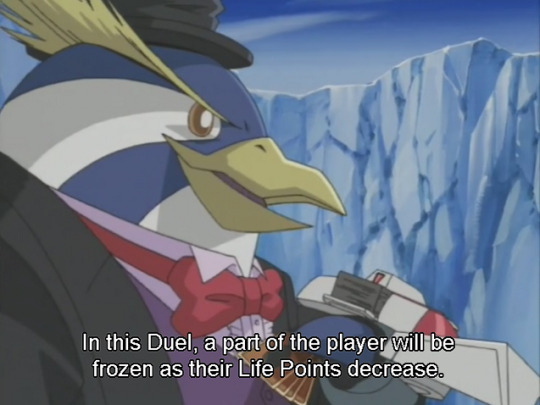
oh my goodness golly gosh. what an absolute twist. truly there is something different about this duel.
So Anzu loses some lifepoints and her feet get encased in ice and they didn’t really bother giving any decent shots of it so I didn’t bother screencapping it because also my will to cheerfully screencap this shit is also being slowly frozen during this duel, but you can imagine it.
And like, obviously, that causes her to be cold. er.
I mean she MUST have been cold before, she’s wearing pretty much the bare minimum of clothes to be decent, and she’s standing on an ice floe in the digital Antarctic? But until her feet are literally encased in a block of ice, she doesn’t react to the cold at all. But now she does. And THIS FUCKER is like,
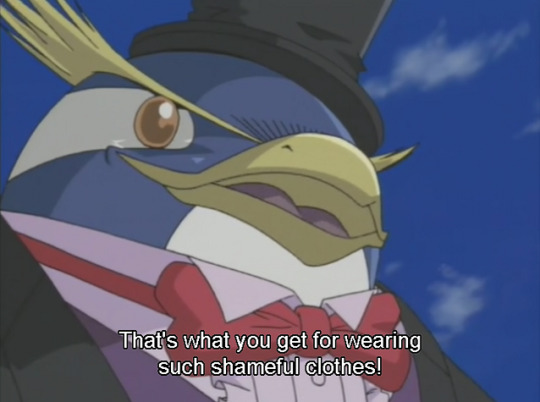
It is INAPPROPRIATE for you to comment on her clothes at all, perv, and rude in the extreme to do so in a judgmental way. Also, bit rich coming from a guy dressed in a tailcoat and no trousers over his penguin fursuit. #shameful
AND THEN
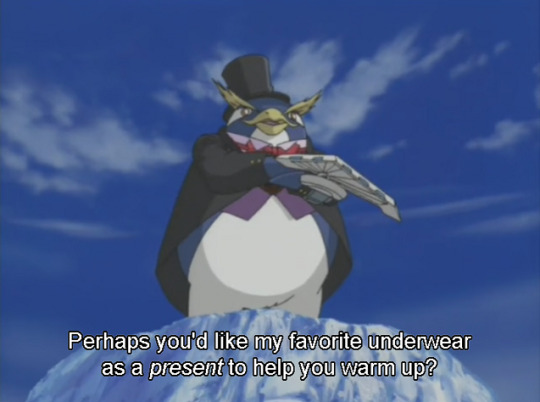
YOU DON’T HAVE UNDERWEAR YOU’RE NOT WEARING PANTS AT ALL
Seriously, though, it squicks me out that they went in this direction with “the girl duel”. They don’t even give Anzu very many “shut the fuck up” lines, even though she is the kind of person to yell back when someone’s being creepy. But like, it’s not necessary. He’s already an evil body-stealing corporate executive, we don’t ALSO have to make him say shit about teenage girls’ underwear. As an ex-teenage girl, this is just off-putting. I would have preferred if Anzu just got the same, normal amount of creepy that the boys get, because unless you go on to meaningfully deconstruct why it’s more harrowing for the girls than the boys due to the sexism in the culture in which they live, having this guy be extra-creepy just squicks female watchers out for no reason. Unless some watchers get off on the idea of Anzu being subjected to those comments, in which case, they can just go get in the sea.
AND they made him really sexist too, for some reason.
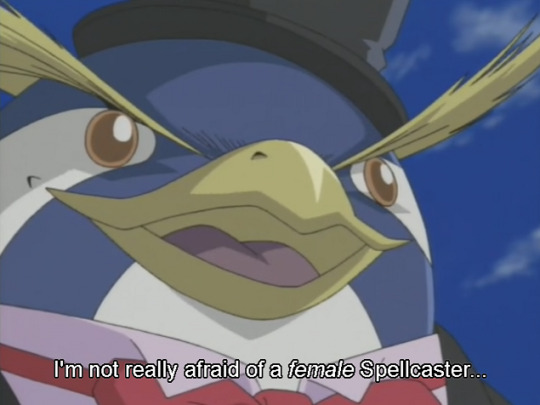
Like???
This guy just has WAY TOO MUCH GOING ON.
He says Dark Magician Girl is useless without Dark Magician, and Anzu’s like, uh, Dark Ma-who now?
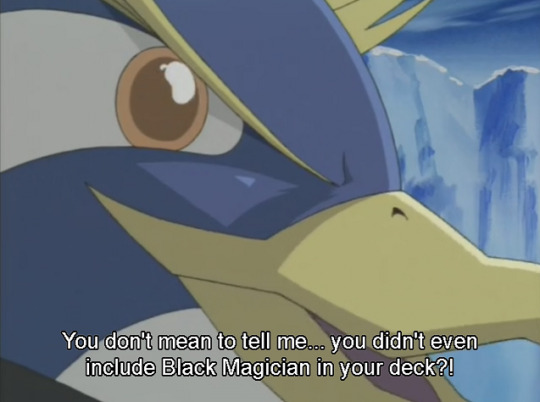
she did not. sigh. I wanted to be annoyed with her for this -- has she even been WATCHING Yugi/Yami duel this whole time -- but then I realised I should be angry with the writers for writing this dumbness into her just so they can pat themselves on the back for their pseudofeminism later but THEN I realised that Penguinfucker just said THIS
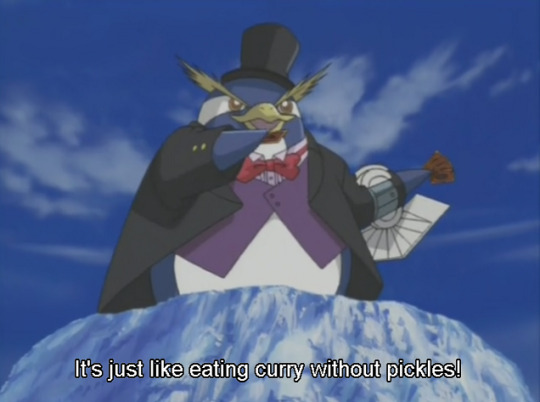
and then I couldn’t be angry with anyone anymore because I had to figure out what the FUCK that means and it took me the rest of my life and I died.
But then luckily, Dark Magician Girl putting her hand over Anzu’s shaking hand to help Anzu draw a card brought me back to life...
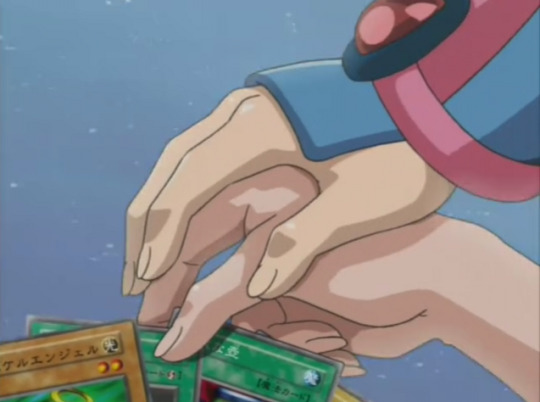
Do you think this means she’s not only solid, but also warm??
You know who definitely is warm?
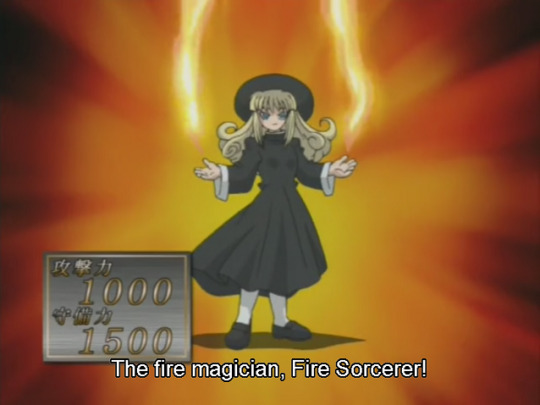
And I just screencapped her because I fucking love her outfit actually I literally dress like this myself so
The Fire Sorcerer does exactly what she says on the tin
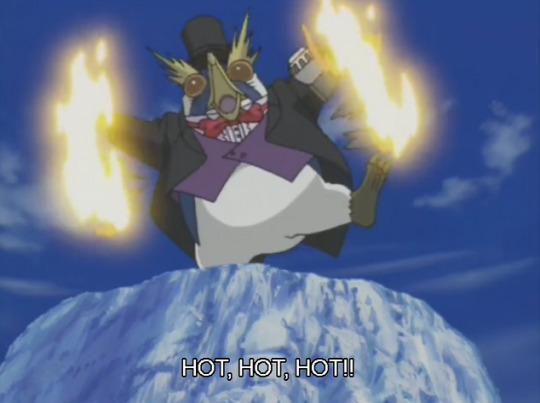
we don’t need no water let the motherfucker burn. burn motherfucker. burn.
Instead of burning to a lifeless, silent pile of misogynistic ashes, we instead get this ABSOLUTELY IRREDEEMABLE ASSHOLE’S fucking Tragic Anime Backstory(tm)
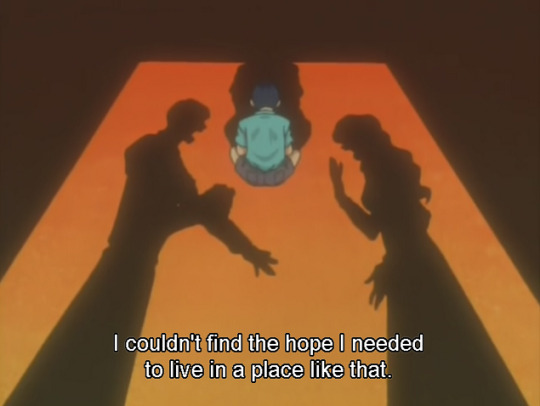
i don’t care. please continue to die in a fire.
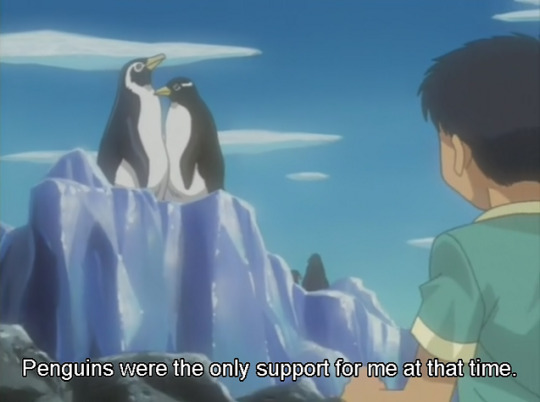
cool story. pun intended. still doesn’t make me even slightly even a bit even at all sorry for you now that you’re a grown-ass adult who kidnaps actual children, skeeves on them, and tries to steal their bodies.
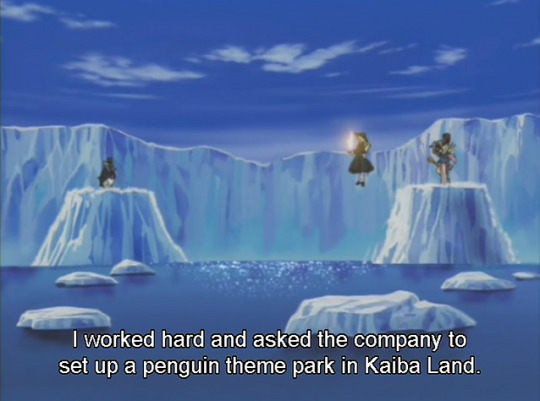
... honestly even if I was inclined to feel sorry for you, you’re drifting away from your one decent card here. “I was raised in a desperately unhappy home” is almost like a believable reason for being a child predator even if it’s not an excuse and you should still be in prison forever. “My boss didn’t like my random-ass theme park attraction pitch cause it had nothing whatso-fucking-ever to do with the theme park’s ... theme” is not winning you sympathy points from me. Or from Seto.
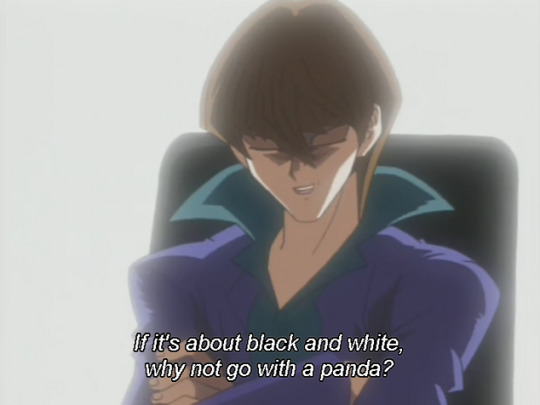
amazing example of a “was that supposed to be a burn?” quippy one-liner from the literally inimitable Seto Kaiba #thatisnotintendedtobeacomplimentbtw
Then, upon recounting such self-inflicted tragedy as consumes his being and sets him on the path to, again, kidnapping and attempted murder, he just ... freaks out.
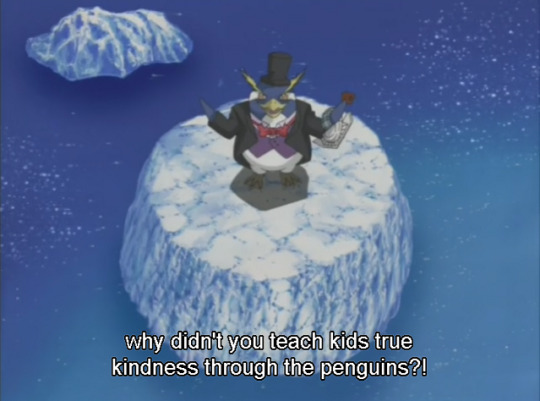
why didn’t YOU learn DON’T FUCKING KIDNAP PEOPLE from the fucking penguins if they’re such valuable role models? seriously if there’s any decent argument for NOT exposing children to penguins, it’s You.
Anyway, he declaims that he will, indeed, follow through on his HIGHLY ILLEGAL AND EVIL plan, culminating in taking Anzu’s place in the world, bypassing KaibaLand completely and...
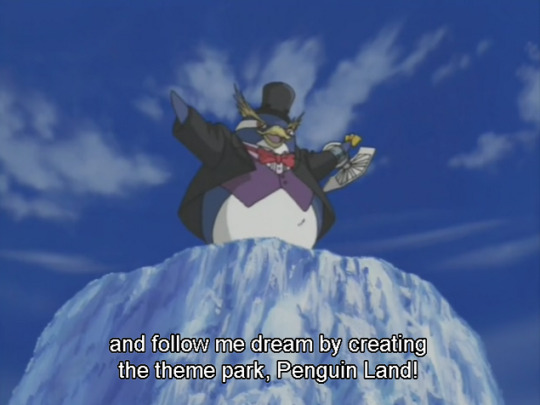
shiver me timbers! HOW is he HOLDING those CARDS???
help me reach my next patreon goal!
help me reach my next payday!
57 notes
·
View notes
Text
Borderline Personality Disorder (BPD) under the Alternative Model
The following is based on the DSM-5’s alternative model for personality disorders in general and Cluster B personality disorders in particular, which I have discussed in previous posts.
—
BPD is the Cluster B personality disorder that is largely distinguished by Negative Emotionality, while also involving either Disinhibition or Antagonism, in which personality dysfunction—along with the destructive patterns that characterise Cluster B more generally—are centred around impoverished self-image and goal-setting, intolerance of stress, emotional volatility, preoccupation with negative evaluation and rejection, and interpersonal interactions that are intense, inconsistent, and toxic.
—
Although the antagonistic traits Manipulativeness and Deceitfulness are not diagnostic with respect to BPD, they do frequently co-occur with it. When such traits co-occur with BPD, the relevant instances of manipulation and deceit tend to constitute desperate attempts to avoid or prevent perceived negative evaluation, rejection, or abandonment (by abusing the person who is expected to impose such a thing). Even when instances of manipulativeness and deceitfulness are insufficiently regular to imply the corresponding pathological traits, the nature of BPD is such that manipulation and deceit are highly likely to occur whenever there is sufficient stress relating to negative evaluation, rejection, or abandonment, and they seem to be the most effective means of prevention.
—
Moreover, while proneness to delusional thinking is not strictly required by BPD, it also frequently co-occurs with it (indeed, the name for the disorder originally comes from the idea that it sits on the borderline between neurosis and psychosis). Accordingly, there is a noteworthy subtype of BPD—Borderline Personality Disorder with Psychotic Features—which amounts to the co-occurrence of BPD with a specific proneness to delusion (in which the psychosis is typically both paranoid and stress-induced), as reflected by either of the following Psychotic traits:
Unusual Beliefs and Experiences (Psychoticism)
Cognitive/Perceptual Dysregulation (Psychoticism)
—
1| The Parts of BPD
Both of the following are present at least by early adulthood:
—
1. Moderate or greater personality dysfunction, manifested by at least two of the following:
Impoverished Identity (Identity)
Goal Instability (Self-direction)
Devaluative Hypersensitivity (Empathy)
Push-Pull Conflictiveness (Intimacy)
2. From among the following seven pathological traits—which are aspects of Negative Emotionality, Disinhibition, and Antagonism—one aspect of either Disinhibition or Antagonism* together with at least three other traits (summing to a total of at least four traits:
Emotional Lability (Negative Emotionality)
Anxiousness (Negative Emotionality)
Separation Insecurity (Negative Emotionality)
Depressivity (Negative Emotionality)
Impulsivity (Disinhibition)*
Risk-taking (Disinhibition)*
Hostility (Antagonism)*
—
2| Personality Dysfunction in BPD
Every instance of a personality disorder involves characteristic difficulties in at least two domains from among Identity, Self-direction, Empathy, and Intimacy. In this section, I shall briefly explain each of the specific difficulties that are characteristic of Borderline Personality Disorder. To this end, BPD specifically requires at least two of the following characteristic difficulties:
—
(Identity) Impoverished Identity: Markedly impoverished, poorly developed, or unstable self-image, often associated with excessive self-criticism; chronic feelings of emptiness; dissociative states under stress.
“I don’t have a good grasp of who I am, either because it’s never clear to me or because it’s constantly changing. It gets a lot worse when I feel overwhelmed or stressed out. At those times, I can lose sight of what I’m like, what I want, and what I believe—or these core aspects of myself can suddenly seem to change in drastic ways. I’m convinced that I’m worthless. I always feel as though something’s missing inside me.”
(Self-direction) Goal Instability: Inconsistency or paucity in goals, aspirations, values, or career plans.
“I often have no idea about what I’m doing or where I’m going. I never know what I want in life; or else I’m momentarily convinced about what I want in life, only to suddenly find myself wanting the complete opposite. So I’m either stuck in one place, going nowhere and doing nothing of consequence, or I’m erratically jumping from one incomplete task to the next.”
(Empathy) Devaluative Hypersensitivity: Impaired sensitivity to the feelings and needs of others, associated with interpersonal hypersensitivity (i.e. proneness to feeling slighted or insulted) and perceptions of others that are selectively biased towards vulnerabilities, weaknesses, or negative attributes.
“Others are either perfectly good or irredeemably bad. Usually the latter. There is no grey area, where the qualities, thoughts, or feelings of others might be located. And no-one likes me. I can’t do anything right. People are always attacking me. People are always thinking bad things about me. When others reach out to me, they usually have ulterior motives or are trying to undermine me in some way. Even when I do think that people are good, they usually turn out to be horrible after all, or end up hating me and rejecting me. All of this stuff is stressful, and leaves me very little room for thinking about what's good for others, or doing things for others.”
(Intimacy) Push-Pull Conflictiveness: Perhaps some capacity for genuine intimacy, but an impaired capacity for intimate relationships that are stable and fully mutualistic. Tendency to bring about close relationships that are intense, unstable, and conflicted, largely because of one’s tendencies of mistrust, neediness, abruptly alternating between overinvolvement and withdrawal, alternately viewing close relationships in extremes of idealisation and devaluation, and anxious preoccupation with criticism, rejection, or abandonment (whether real or imagined). [Representing things in extremes of idealisation and devaluation is called ‘splitting’, as is abruptly shifting between such representations of something.]
“My closest connections to others are confusing and often terrifying. Such relationships can be really important to me. Too important. So important, in fact, that they can get too painful to bear and must be invalidated or destroyed. I often crave closeness and affection, but then when I end up getting close to people, they usually force me to cut them loose and get rid of them. They either turn out to be massive disappointments, or they just make me anxious all the time because they're bound to hurt me and abandon me. So I have no choice but to hurt them and abandon them. Sometimes I want to be as close to other people as possible, but then suddenly I will want absolutely nothing to do with them. My significant others are perfect and can do no wrong. My significant others are evil monsters who just want to hurt me. My significant others have no significance whatsoever and I couldn’t care less about them.”
—
It is well worth comparing these characteristic difficulties to the ways in which Identity, Self-direction, Empathy, and Intimacy operate in healthy personalities. For this purpose, I have sketched out a healthy personality profile here.
—
3| Pathological Traits in BPD
Every instance of a Cluster B personality disorder involves a sufficient combination of pathological traits, all of which are aspects of either Disinhibition, Antagonism, or Negative Emotionality. In this section, I shall briefly explain each of the pathological traits that might be involved in instances of BPD. To this end, BPD specifically requires at least four of the following seven aspects of Negative Emotionality, Disinhibition, and Antagonism, at least one of which must be either an aspect of Disinhibition or the trait Hostility (which is an aspect of Antagonism):
—
Emotional Lability (Negative Emotionality): Unstable emotional experiences and frequent mood changes; emotions that are easily aroused, intense, and/or out of proportion to events and circumstances.
Anxiousness (Negative Emotionality): Intense feelings of nervousness, tenseness, or panic, often in reaction to interpersonal stresses; worry about the negative effects of past unpleasant experiences and future negative possibilities; feeling fearful, apprehensive, or threatened by uncertainty; fear of falling apart or losing control.
Separation Insecurity (Negative Emotionality): Fears of negative evaluation by, rejection by, and/or separation from significant others—which is associated, somewhat paradoxically, with fears of being excessively dependent on significant others, or complete loss of one’s autonomy.
Depressivity (Negative Emotionality): (Often-but-not-necessarily associated with suicidal behaviour or thoughts of suicide) frequent feelings of being down, miserable, and/or hopeless; difficulty recovering from such moods; pervasive pessimism about the future; pervasive feelings of shame; and/or pervasive feelings of inferior self-worth.
Impulsivity (Disinhibition): Acting on the spur of the moment in response to immediate stimuli, acting on a momentary basis without a plan or consideration of outcomes, and/or difficulty establishing and following plans. Particular to BPD: an experienced sense of urgency during emotional stress, which might result in self-harming behaviour.
Risk-taking (Disinhibition): Engagement in dangerous, risky, and potentially self-damaging activities unnecessarily and without regard for consequences; proneness to boredom together with thoughless initiation of activities to counter boredom; and/or lack of concern for one’s limitations, or denial of the reality of personal danger.
Hostility (Antagonism): Persistent or frequent angry feelings; anger or irritability in response to minor slights, minor insults, or possibilities thereof; and/or mean, nasty, or vengeful behaviour.
—
(Next: Narcissistic Personality Disorder under the Alternative Model.)
0 notes
Text
FEATURE: Humanity's Worst, Front and Center on the Anime Stage
Humanity's Worst, Front and Center on the Anime Stage
By Ian Mertz
There is a sadistic thrill that comes with watching people acting against our ingrained sense of morals, or better yet, against society's standards of good in favor of our secret rebellious desires. When Lupin the Third came on the anime scene in the early 70's, with its titular pragmatic thief, it was a huge shift from the model of protagonists who embodied the forces of absolute moral good. Even the punks who so often popped up as the stars in early sports classics brought a bit of that wild side out in the show, let alone more aggressively amoral characters like the swashbuckling interstellar Cobra or the hitman Golgo 13. Flash forward to 2017, and as if an old otaku made a poorly worded deal with the devil we got a season of protagonists who moonlight as terrible human beings, with both hilarious comic headliners and bone-chilling pragmatists coming to call. These are their stories.
KONOSUBA -God's blessing on this wonderful world! 2
Back in the 80's and 90's, prominent writers such as Rumiko Takahashi and Yoshihiro Togashi noticed that if they wanted to make their protagonist funny, one thing they could do is make their protagonist kind of a dick. Characters like Yu Yu Hakusho's Yusuke Urameshi, Ghost Sweeper Mikami's Tadao Yokoshima, and Urusei Yatsura's Ataru Moroboshi were all generally moral people, but had many of the failings one would expect of a teenage boy: perverted, insensitive, and just generally causing trouble. Again, they had a baseline morality usually shown through their devoted love interest, who indirectly acted as their anchor, someone who brought out the best in our hopeless hero.
The first show on our list, KONOSUBA -God's blessing on this wonderful world!, tosses that morality out the window, and instead of a love interest just lets the whole harem get in on the amoral fun. Adventurer Kazuma Satou is just as lecherous and abrasive as any rom-com hero, but instead of a soft spoken heroine to bring out the non-existent goodness in his heart, he gets three companions at least as bad as him. It turns out having characters who are generally good on the inside is better for character development and storytelling, but when you take that away from them the result is plain hilarious, especially with the sense of comedic timing the show has honed over its last season.
Of the three the show mostly centers on Aqua, the goddess Kazuma forcibly brought on his adventures. She is the only one in the show with a tongue as sharp as Kazuma's, and neither of them will let the other's failures go unnoticed, nor their own successes go without a good long stretch of gloating. When Aqua purifies a great spirit rooted to the world against his will, she spends the rest of the episode reveling in her almighty powers as a goddess right in front of Kazuma's face; when it turns out the purification also set a horde of monsters upon the city in the process, Kazuma's insults bring her to the verge of tears.
The other two provide endless fuel for Kazuma's morally abhorrent personality too. While the masochistic holy crusader Darkness left the center stage for a while at the start of this season's KONOSUBA -God's blessing on this wonderful world! 2, she is back and in rare form, having gone so far into the realm of fetishizing her own pain and humiliation that Kazuma can no longer even insult her without feeding her complex further. The crowd favorite, the explosion junkie Megumin, has also been stepping up as perfect fodder for Kazuma this season. It's a mark of both great writing and the author's particular penchant for creating human trash when the show's greatest exposition thus far this season is that Megumin spent her younger years taking some kid's lunch money after class.
Masamune-kun's Revenge
And maybe it's a mark of a good anime season that she isn't the only character stealing people's lunch. One of the more popular romantic comedies this season, Masamune-kun's Revenge features a burgeoning couple who would be right at home with the KONOSUBA -God's blessing on this wonderful world! cast. I say burgeoning because they aren't a couple at the start of the story, nor do either of them like each other, and not in a simple Ranma ½ -style tsundere mismatch. Masamune Makabe wants nothing more than to be asked out by the school idol Aki Adagaki, who is notorious for hating men and rejecting them in cruel and mortifying ways. His motivation? To mortify her right back, the girl who teased him when they were kids. He completely reworked his appearance to the point where he's a heartthrob among the girls, but he passes up his chances at love for that one shot of sweet karmic justice.
And despite how comically petty he is for even trying, Aki sells herself as such a terrible person that we can't even blame him. Besides sticking all the boys who ask her out with insulting, albeit meticulously researched, monikers, she also eats both her share of lunch and most of her best friend's bread on top. Good for her that she eats healthy, but the self-absorbed way she orders her friend to buy her more food, away from the prying eyes of the other girls who respect her so highly, makes us want Masamune to take her down a peg too.
Or such is the premise. In reality while KONOSUBA -God's blessing on this wonderful world!'s cast is designed to be irredeemable, as we dive a bit deeper into Masamune and Aki we get to see a bit of their softer sides, on guard due to their past experiences (with each other), but prone to slipping up all the same. Masamune, focused on his revenge plot, learns through shoujo manga and botches his plans so often and so thoroughly that he ends up needing coaching from an insider in Aki's life. Meanwhile Aki is so clueless that she not only proudly wears cosplay to her first “date” with Masamune, but she derides him for thinking that that's wrong. As they both continue to hurdle towards ruining each other's lives again, the comedy and romance we're treated to is sometimes enough to hope they learn to be less petty and narcissistic, or it would be if it weren't so amusing to watch their misguided battle.
Saga of Tanya the Evil
But not all this season's terrible people are funny. Sometimes being registered as a terrible person implies something more akin to that title. Sometimes we are given a character who is genuinely morally repugnant, the kind of person who would get their family killed for a dollar and a pat on the back. These are the people outside the realm of 80's comedy; these are the people who would more likely show up on a police blotter, or worse, a thousand documentaries asking what went wrong. Thankfully in Saga of Tanya the Evil, it's easy to see what went wrong: someone gave that person a gun, a uniform, and an incentive to kill.
When even the title registers Tanya, a girl who was given too much power in the army as a result of her abnormally developed magical powers, as “evil,” there's a pretty clear message being sent to us the viewers. There is little to no room for sympathizing with her, which is made worse by the fact that we understand her completely. She is vindictive, setting up a group of soldiers who disobeyed her to be killed by the enemy in the next attack. She chooses every word to better her chances at staying safe and away from the front line, whether it be to her superior officers or to her friends celebrating a new birth in their household. We see her pushed to the brink of death in a fight, and we see the unbridled joy she feels at letting her powers loose on anyone who bleeds red and looks at her the wrong way.
But we also see her slip up, either tricked by those who are wise to her manipulative words or tripped up in her own ambitions. As Tanya is rising to power, the show is shaping up to be something we don't see to often in anime: a classic Greek fall from hubris. As we dive into her thought processes and motivations, we start to see all the fatal flaws that will inevitably come back to her, all the ways in which she won't learn from her mistakes while they're small. Besides the well-choreographed action and the detail put into Tanya's crazed facial expressions, the true gem of the show is watching Tanya's character, as a textbook case in greed, ambition, psychopathy, and if all goes well, in a fall from grace.
Scum's Wish
On that note, I would be remiss to not at least mention the crown jewel of this season's lineup of amoral characters. I read the manga for Scum's Wish a few years ago, and was thoroughly caught up in how shockingly awful—yet shockingly believable—the entire cast was. Each character sets out to outdo the last, while at the center lies a single doomed couple: Hanabi Yasuraoka and Mugi Awaya, the power couple of the school. To their friends and classmates both of them are perfect, and perfect for each other. But they share no love between them; both are only out to soothe their loneliness over loving someone else. For Hanabi it's her brother, a schoolteacher who has a crush on Mugi's tutor from afar. For Mugi of course, it's that very tutor, who seems aloof to the whole situation save for being very attuned to Hanabi's moods.
A love polygon develops with these four and a whole slew of their friends, each of whom is willing to use, bully, and manipulate one another to feel just a little less lonely in the world. Just as surprising as the explicit sexual encounters between the characters are the ways in which the script captures their thoughts, their disgusting and distasteful ways of getting one another to give up their other loves, their other friendships, even their mental state of being. It's not haphazard, nor is it solely a statement on the evil in people's hearts. It is perfectly balanced and calculated to show their desperation, and how they try to navigate love and friendship in the wrong way.
This season's adaptation adds an additional layer to the manga, namely framing it as tragic. In particular Hanabi's character flaws are downplayed in comparison to the other characters, and she serves as the main focus through which we see the story, which develops her character so well that despite having seen her original manga personality I even started to feel bad for her at some point. Soft watercolor notes in the artwork, reordering events and changing up the pacing, and good use of soundtrack make her romance with Mugi into a fully fledged romantic tragedy, one from which there's no straight answer, with no clear line between bad people and misguided friends, as both bring her pain all the same.
The following series are available for viewing NOW on Crunchyroll!
KONOSUBA -God's blessing on this wonderful world! 2
Masamune-kun's Revenge
Saga of Tanya the Evil
----
Ian Mertz is a graduate student in Toronto. He works in Computer Science though, so don't take his opinions on anime too seriously.
0 notes